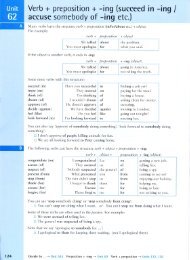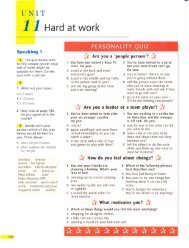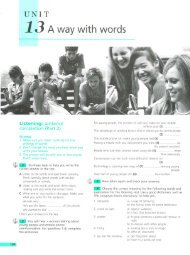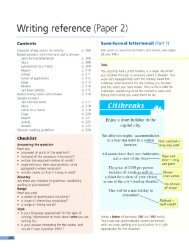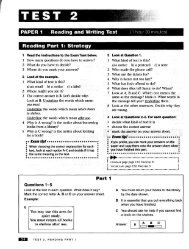I Vo.t are going to hear a news broadcast. Before you listen,look at ...
I Vo.t are going to hear a news broadcast. Before you listen,look at ...
I Vo.t are going to hear a news broadcast. Before you listen,look at ...
You also want an ePaper? Increase the reach of your titles
YUMPU automatically turns print PDFs into web optimized ePapers that Google loves.
2 Prepositions of time<br />
At, on andin<br />
Ar is used:<br />
c for a point of time:<br />
... <strong>at</strong> the start of her ettennpt <strong>to</strong> sail alone<br />
across the Pacific.<br />
r' for the time of day:<br />
<strong>at</strong> six o'clock, <strong>at</strong> dawn, <strong>at</strong> lunchtime<br />
I for seasonal holidays:<br />
<strong>at</strong> Christmas, <strong>at</strong> Easter<br />
r for the following expressions:<br />
<strong>at</strong> the weekend, <strong>at</strong> first, <strong>at</strong> lest, a.t present<br />
(= now), a.t the moment (= now), <strong>at</strong> times<br />
(= sometimes), <strong>at</strong> once (= immedi<strong>at</strong>ely)<br />
On. is used for d<strong>at</strong>es and days (including<br />
special days):<br />
on Monday, on 3rd December (note th<strong>at</strong> we<br />
say: on the third of December), on New Year's<br />
Day, on Christmas Day, on my wedding<br />
anniversary<br />
In. is used for all or part of a period of time:<br />
in the afternoon, 'in winter, in the twenty-first<br />
century, in the Middle Ages<br />
By andu.ntil<br />
By means th<strong>at</strong> something happens not l<strong>at</strong>er<br />
than, and possibly before, the time mentioned:<br />
,.. she sill intends <strong>to</strong> be in Chile by the end<br />
of the year. (= <strong>at</strong> the end of the year, or<br />
possibly before)<br />
Can we finish this worle by four o'clocle? (= not<br />
l<strong>at</strong>er than four o'clock)<br />
Until means th<strong>at</strong> something continues up <strong>to</strong>,<br />
but not l<strong>at</strong>er than, the time mentioned:<br />
,,. part of the mo<strong>to</strong>rway will remain closed until<br />
this afternoon. (= it will open this afternoon)<br />
Until is often used with a neg<strong>at</strong>ive, meaning<br />
'not before':<br />
We can't e<strong>at</strong> until all the guests arriue. (= we<br />
can e<strong>at</strong> when they <strong>are</strong> all here)<br />
In, ihning andfor<br />
In and d"rirg <strong>are</strong> often used with the same<br />
meaning:<br />
In / During the summer we often go for<br />
long walles.<br />
bu duri.ng shows a particular event against<br />
the background of a period of time:<br />
The manager was released ihning the night ...<br />
especially if it is an interruption:<br />
They walleed out of the hall il.uring the speech.<br />
For shows how long something lasts:<br />
He will remain <strong>at</strong> the conference for two days ,..<br />
We went <strong>to</strong> Spainfor the summer.<br />
In shows how soon something happens:<br />
In less than an hour we had <strong>hear</strong>d all about<br />
his aduentures.<br />
I'll meet <strong>you</strong> in ten minutes.<br />
185


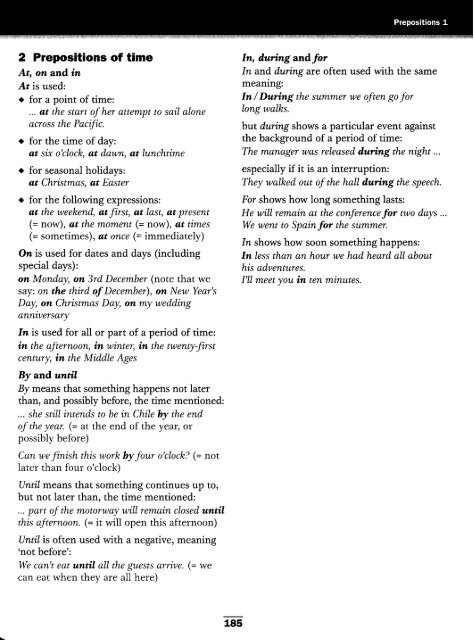
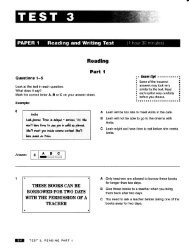
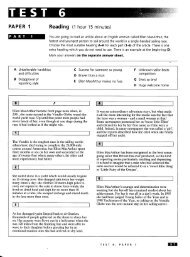
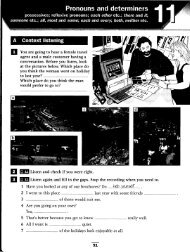
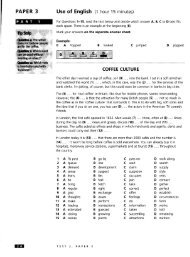
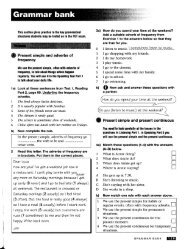
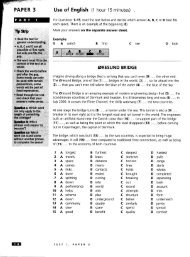
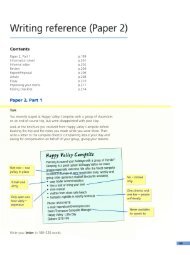

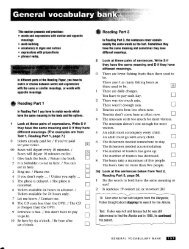
![T]NIT 9 A new look](https://img.yumpu.com/40125756/1/190x248/tnit-9-a-new-look.jpg?quality=85)
